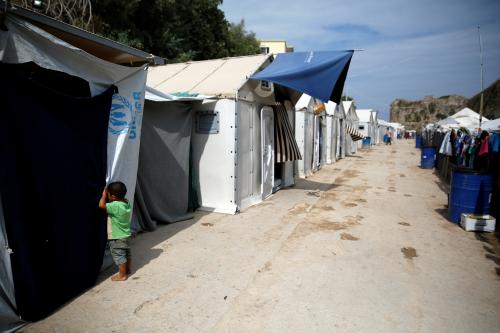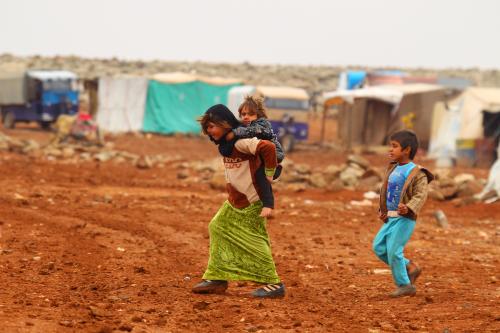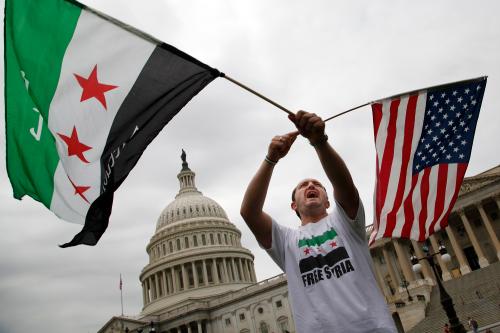This week, heads of state and senior officials from around the world are gathering in New York for the highest-level meetings ever convened on refugees. Given the urgent and growing needs of the world’s 21 million refugees, these meetings offer an important opportunity to bring the international community together and galvanize action.
Yet there is reason to be concerned that the week’s deliberations may not accomplish any meaningful outcomes. The U.N. General Assembly’s plenary on refugees and migrants, which takes place today, produced only anodyne reaffirmations and an agreement to take another two years to reach a global compact on responsibility sharing.
President Obama’s summit on refugees Tuesday offers another, and perhaps final, opportunity to get things right. His administration has announced three goals:
- Increase by 30 percent the financing for global humanitarian appeals, from $10 billion in 2015 to $13 billion this year;
- double the number of resettlement slots and alternative legal pathways for admission that are available to refugees, and increase the number of countries accepting refugees; and
- increase the number of refugees worldwide in school by one million, and the number of refugees granted the legal right to work by one million.
[T]he summit is focused on pledges, and pledges are not always fulfilled.
These are laudable goals and the president deserves credit, but many experts worry that the summit could fall short of creating momentum for tangible outcomes. This is in part because the summit is focused on pledges, and pledges are not always fulfilled. But it’s also because there is not enough specificity on how these pledges can be deployed immediately in ways that will have measurable impact.
Against this backdrop, the president should use the summit to offer specific remedies for those fleeing violence in Syria, who make up almost 25 percent of the world’s 21 million refugees. Getting it right for Syrian refugees is an important step in getting it right for refugees in other places in the world.
With the need for these tangible steps in mind, here are six goals for President Obama’s summit:
- Identity a humane solution for refugees in Greece. There are 60,000 refugees stuck in Greece, many of whom are living in bleak conditions in isolated camps or facilities. These refugees need access to dignified shelter and better healthcare. The president should ensure that these refugees are not overlooked in his summit and that responsibility is shared by the international community to identify and support a humane solution.
- Open the Syrian-Jordanian border. There are 75,000 displaced persons trapped on the Syrian side of the Syrian-Jordanian border. These persons are in a no-man’s land known as “the berm,” where conditions are worsening by the week. Food and water are running out, disease is rife, and people are starving and dying. Jordan has been extremely welcoming of Syrian refugees (taking in more than 600,000), putting most Western nations to shame. But increased security concerns (including a suicide bombing) led Jordan to close its border and halt humanitarian assistance at the berm in late June 2016. Jordan has indicated that it will resume its humanitarian responsibilities, but it will not do so without increased international support and cooperation. President Obama should lead the international community to urgently: work with Jordan to open the border to provide humanitarian support to the encampments at the berm; increase funding and technical support to Jordan for refugee screening at the border; and resettle the most vulnerable refugees to third countries.
- Resettle the most vulnerable Syrian refugees. The U.N. High Commissioner for Refugees estimates that 10 percent of Syrian refugees (approximately 500,000 people) fall into the category of the most vulnerable. These individuals include single-parent, female-led families; orphans and unaccompanied minors; the disabled and infirm; and survivors of torture. Local integration in frontline states is not a viable option for these individuals. Yet as of March, only 130,000 resettlement places were pledged by the world’s wealthiest nations; of those pledges, only 1.39 percent were actually resettled. In a recent report, Oxfam outlines how a coalition of 28 countries could reasonably manage receiving the remainder of the most vulnerable Syrian refugees. President Obama should lead the global community in helping find resettlement or other legal pathways for all of the most vulnerable Syrian refugees. This goal is achievable if the president builds a coalition of resettlement nations, which should include a number of non-traditional resettlement states from the Arab Gulf and South America.
- Open labor markets in frontline states. The most immediate need of refugees in the frontline states is access to labor markets. In many instances, refugee families are saddled with debt and lack opportunities to earn a livelihood. Without legal access to the labor market, refugees will quickly deplete humanitarian aid; undermine local economies by taking work for cut-rate wages; expose themselves and their families to economic and social predators; and force their children to work in order to survive. President Obama should specifically raise this at the summit, challenging the international community to provide support and incentives to host governments to grant legal registration and work permits to all refugees.
- Make education available in frontline states. In 2015 there were more than 700,000 Syrian refugee children out of school (250,000 in Lebanon, 90,000 in Jordan, 400,000 in Turkey). In too many cases, economic hardship is forcing children into labor to provide for their families, often because their parents do not have residency and work permits. When refugee children are unable to attend school, they have difficulty integrating into their host societies and are likely to be a greater burden on the host country’s economy in the future. President Obama should also raise this topic and challenge the international community to work with frontline states to ensure that every Syrian refugee child has access to K-12 education by January 1, 2017.
- Adapt and improve aid. Traditional government aid for refugees is invaluable, but it should reflect the reality of the 21st century. Today most refugees do not live in camps; they live in cities in frontline states, and do not leave quickly, which can fuel resentment among local communities. Donor governments should prioritize projects in host countries, particularly in cities, which benefits both the host communities and refugees. Donor governments need more flexibility for moving money from short-term humanitarian aid accounts to longer-term development accounts. President Obama should challenge the international community to adapt and improve aid in ways that will mobilize greater support for host states, local communities, and refugees alike.
President Obama’s decision to host this summit is a commendable one. The more important test of his leadership on this issue, however, will come after the diplomats have left New York. If the president is to make refugees more than a slogan in this U.N. General Assembly, then he must lead and challenge the international community for more action and cooperation on concrete outcomes, both tomorrow and in the months to come.







Commentary
The year of the refugee: It’s gut-check time for President Obama
September 19, 2016